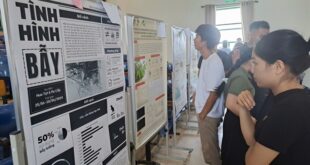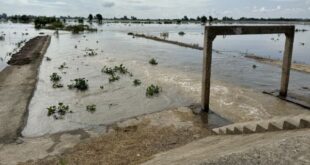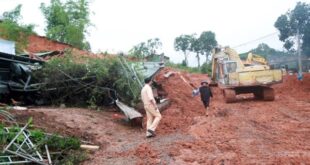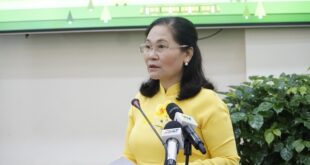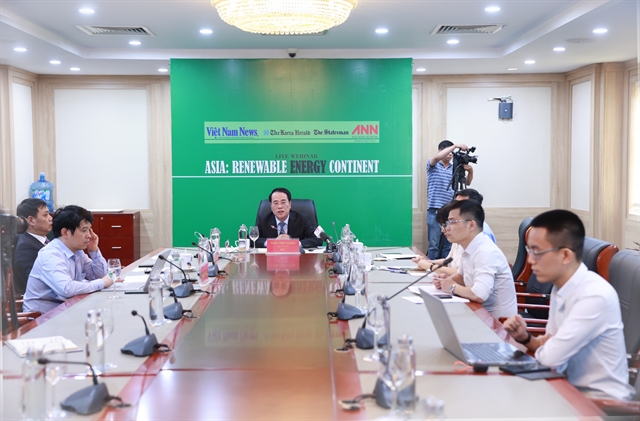
HÀ NỘI — The Minister of Natural Resources and Environment on Wednesday sent a message, highlighting seven focus points to fully unleash Asia’s potential for renewable energy development.
Minister Trấn Hồng Hà, in his message to the webinar “Asia: Renewable Energy Continent” held on Wednesday, said: “Climate change, environmental pollution and ecosystem degradation are the crises to humanity today.
“The Sixth Assessment Report, Climate Change 2022 of the Intergovernmental Panel on Climate Change (IPCC-AR6) once again sounds the alarm bell, that if the global warming is not controlled within 1.5 degree Celsius compared to pre-industrial times, it will result in irreversible harm to human and natural systems.
“IPCC estimates that since 2008, devastating floods and storms have forced more than 20 million people from their homes each year; while half the world’s population face water scarcity for at least one month every year.”
According to the International Energy Agency, global carbon emissions from energy combustion and industrial processes have increased to 36.3 billion tonnes of CO2 equivalent in 2021, the highest annual figure and an increase of 6 per cent compared to 2020. At the same time, the World Meteorological Organisation announced in May 2022 that the four key climate change indicators – greenhouse gas concentrations, sea-level rise, ocean heat and ocean acidification, have set new records in 2021.
This is yet another clear sign that human activities are causing planetary-scale changes on land, in the ocean, and in the atmosphere, posing harmful and long-lasting ramifications for sustainable development and ecosystems, Tăng Thế Cường, director general of the ministry’s Department of Climate Change, said while delivering the message on the minister’s behalf.
This is the consequence of an unsustainable development model based mainly on fossil fuels over the past 150 years, he added. And this is not yet to mention the loss of millions of people around the world due to air pollution caused by the use of fossil fuels.
“Therefore, if there is any delay in reducing carbon emissions and providing support to climate change response, we will miss the golden opportunity to ensure a habitable Earth and a sustainable planet for all in the future.”
At the same time, recent conflicts in the world have been causing a continuous surge in oil prices (oil price have reached US$120 per barrel and are forecast to continue rising when major economies recover after the COVID-19 pandemic), affecting every aspect of socio-economic activities around the world. People in developing countries, in particular, are the ones most impacted. That has once again shown the unsustainability of the fossil fuel-based development model.
Climate and fossil fuel crises present us with a new growth opportunity by transforming the development model, shifting from fossil fuels to renewable energy obtained from solar and wind energy. Developing countries are being presented with the opportunity to leapfrog others towards clean energy, which will help with both socio-economic development and pollution reduction, especially air pollution.
The minister’s message reiterated a speech made by UN Secretary-General Antonio Guterres: “Renewables are the only path to real energy security, stable power prices and sustainable employment opportunities. If we act together, the renewable energy transformation can be the peace project of the 21st century.”
The Group of Seven (G7) has recently pledged to phase out coal power, reaffirming that shifting from fossil fuel to clean, renewable energy is the inevitable global trend.
Asia is the continent of the fastest economic growth in the world, and also of the highest level of energy consumption. The demand for energy in the region is continually rising due to urbanisation and industrialisation happening at breakneck pace.
Asia is also a region with tremendous potential in renewable energy, alongside significant knowledge and expertise in renewables. However, the rate of renewable energy remains modest in comparison to ‘traditional’ ones.
Therefore, along with economic model transformation, energy transition plays a key role in implementing the UN’s Sustainable Development Goals, contributing to the net-zero emissions target by 2050, Hà said.
He suggested seven focus points to fully unleash the potential of renewable energy, as well as accelerate the transition from fossil fuel to renewable energy.
First, renewable energy needs to become a public good that serves all people, so that everyone can have access to and benefit from renewable energy development and energy transition. In particular, communities or groups that are adversely affected by energy transition need to be provided support in terms of livelihoods and education for vocational transition.
Second, it is necessary to promote cooperation between countries in removing barriers, including those in intellectual property rights, to spur the sharing of knowledge and drive collaboration in scientific research, development, and technology transfer in the field of renewable energy from developed countries to developing ones.
Third, policies play a critical role in propelling energy transition. Therefore, policies and frameworks appropriate to each country are needed to encourage the business community to increase investments in renewable energy, as well as to promote energy transition, from the planning stage, to licensing, management, and operation of renewable energy development projects.
Fourth, targets related to developing renewable energy, achieving net zero emissions, and reducing air pollution should be established, which would serve as criteria for making investment decisions and developing energy projects. In particular, it is necessary to secure the commitment from and responsible participation of the financial system, including multilateral development banks, financial and credit institutions, through aligning their lending portfolios towards accelerating the renewable energy transition
Fifth, there should be increased investment in power transmission systems to maximise the benefits of wind and solar energy production, and more investment into infrastructure projects that accelerate the application of clean technologies such as electric vehicles (EVs), for example, electric cars and motorbikes.
Sixth, in addition to efforts to bolster energy transition and unleash the potentials of renewable energy, it is necessary to synchronously implement other solutions, such as the restoration of natural ecosystems that are resilient to climate change to enhance adaptation capacity and carbon sequestration; promoting circular economy in order to make the most efficient use of resources while conserving resources for future generations; and deploying technology solutions for carbon capture and storage to contribute to the realisation of net zero target; etc.
Finally, in order to promote renewable energy development in Asia commensurate with its potentials, there should be active participation of media and press agencies in the region. The news and media agencies will contribute to spreading the message on the urgency of energy transition, as well as helping the business community and people better understand about the economic, environmental, and social benefits brought about by renewable energy.
The official stressed that Việt Nam is one of the countries heavily affected by climate change. With the motto of action and responsibility, at COP26, the country has made strong commitments towards net zero emissions by 2050, shifting from coal fuel to renewable energy.
As one of the fastest growing economies in Southeast Asia with a great need for renewable energy transition, the Government of Việt Nam has developed a number of mechanisms and policies to stimulate a robust development of renewable energy, Hà said.
Việt Nam’s solar PV capacity increased from merely 86MW in 2018 to about 16,500MW in 2020, making it the country with the largest installed solar energy capacity in ASEAN, Hà said. Furthermore, the country was also among the top global 10 countries with the most installed solar capacity in 2020.
In terms of wind power potential, Việt Nam has very favourable climate and terrain conditions for wind power development, and investment prospects are bright. Việt Nam has the largest wind resource in the region with an estimated potential of 311GWs, thanks to the country’s long and narrow geography (the country boasts 3,000 kilometres of coastline, including hills and mountains). According to a World Bank study, more than 39 per cent of areas in Việt Nam have an annual wind speed of more than 6m/s (at 65m height), equivalent to wind energy of 512GW. As much as 8.6 per cent of land and water areas in the country are deemed suitable for large wind farms.
According to Hà, in order to promote the development of renewable energy and contribute to the country’s international commitments, the Vietnamese Government will continue to reform administrative procedures related to licensing and management of renewable energy projects, gradually developing incentive mechanisms in accordance with the country’s condition for renewable energy development projects, especially offshore wind power plants, hydrogen and ammonia production, geothermal power, and wave power.
“Any transition may encounter difficulties and challenges at the beginning. Therefore, the synergy between governments, businesses, and communities are very crucial, including the mechanisms and policies development from the governments, investments from businesses, and the support from the community.
“This is the premise to attract more potential capital sources for renewable energy in the future, as well as a demonstration of the national commitment and responsibility in joining hands with the international community to address the global challenges related to climate and environment.”
The online conference was organised by the national English language daily newspaper Việt Nam News, in collaboration with The Statesman from India, and The Korea Herald from South Korea, who are members of the Asia News Network (ANN). — VNS
- Reduce Hair Loss with PURA D’OR Gold Label Shampoo
- Castor Oil Has Made a “Huge” Difference With Hair and Brow Growth
- Excessive hair loss in men: Signs of illness that cannot be subjective
- Dịch Vụ SEO Website ở Los Angeles, CA: đưa trang web doanh nghiệp bạn lên top Google
- Nails Salon Sierra Madre
 VnExpress News The News Gateway of Vietnam
VnExpress News The News Gateway of Vietnam
